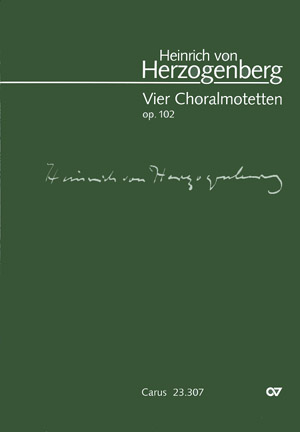
Four chorale motetts
Heinrich von Herzogenberg’s interest in the motet form based on a cantus firmus can be traced back to the middle years of his tenure in Leipzig (1875–1885). For three of the four chorale motets (Nos. 1, 3, 4) he chose hymns which were also known as “traditional melodies” outside a liturgical context and, in two cases (Nos. 3 and 4), were sung by both faiths. Each of the four chorale motets are concerned with suffering and death. With regard to the size of the choir, Herzogenberg envisioned a large mixed choir. Therefore, larger choirs can also sing the motets a cappella.
Purchase
Additional product information
Contents
-
Composer
Heinrich von Herzogenberg
| 1843-1900Heinrich von Herzogenberg, geb. 1843 in Graz, gest. 1900 in Wiesbaden. Jura und Philosophiestudium in Wien, später Student am dortigen Konservatorium; 1874 Mitbegründer und zeitweise Leiter des Bach-Vereins in Leipzig; 1885 Direktor der Kompositonsabteilung der Königlichen Musikhochschule in Berlin; enger Freund von Johannes Brahms. Seine Motetten und Kirchenoratorien belegen sein kontrapunktisches Können. Personal details
-
Editor
Konrad Klek
Reviews
[...] Herzogenberg veröffentlichte diese Motetten 1898, wobei er auf bereits vorliegende Werke zurückgriff, die er zum Zwecke des Studiums der Cantus-firmus-Verarbeitung angefertigt hatte. Die relativ kurzen Motetten von angenehmem Ambitus und mittlerem Schwierigkeitsgrad sind eine Bereicherung für Gottesdienst oder Konzert. Konrad Klek folgt in seiner Neuausgabe dem Erstdruck der Werke, sorgte aber für eine modernisierte Orthographie und ergänzte heute gebräuchliche Wortvarianten.
bast
Quelle: Musica Sacra, Heft 2 / 2008
Frequent questions about this work
 There are no questions and answers available so far or you were unable to find an answer to your specific question about this work? Then click here and send your specific questions to our Customer Services!
There are no questions and answers available so far or you were unable to find an answer to your specific question about this work? Then click here and send your specific questions to our Customer Services!




